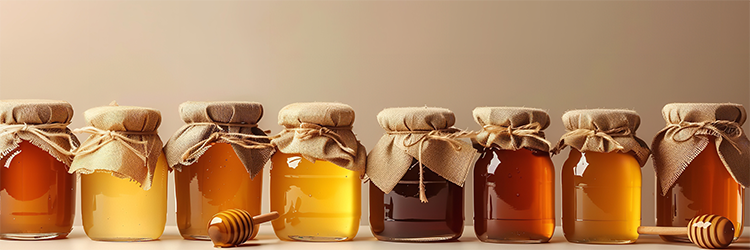
Manuka honey is a medicinal honey native to New Zealand. It's often sold in raw form, and there are a surprising number of clinical trials on its health effects.
But is manuka honey really the healthiest type of honey? What health effects is it shown to have in research studies? What was our experience testing it? And how does it compare to regular store-bought pasteurized honey?
In this article we'll answer all of these questions and more, as we analyze research studies on manuka honey to document three health benefits it's clinically shown to have, and to compare its healthiness to store-bought honey.
We'll also share our experience testing manuka honey.
Key takeaways:
- Manuka honey is clinically shown to support gut & immune health
- Healthier than traditional, pasteurized honey
- Manukora MGO 850+ is our top overall manuka honey pick
Three Proven Health Benefits
1) Gut Health Support
Manuka honey supplementation has been shown in multiple clinical trials to have beneficial effects on the gut.
A 2024 clinical trial reported that manuka honey ingestion "correlates with beneficial modulation of gut microbiota composition."
This type of honey has also been shown to reduce gastrointestinal reflux disease (GERD) symptoms.
100% of trial participants with GERD experienced improvements to their condition in a clinical trial published in the Food Science & Nutrition journal.
2) Unique Phytonutrients
Manuka honey is clinically shown to be rich in dihydroacetone, which is a precursor to methylglyoxal (MGO).
Higher levels of MGO from diet were shown in a 2022 population study to be associated with lower levels in inflammation in the body.
It's important to note that higher circulating levels of MGO in the blood (as a byproduct of other metabolic processes) may be associated with negative health outcomes, but this appears to be entirely distinct from MGO in diet.
3) Immune Support
Manuka honey has anti-bacterial and anti-fungal effects, both topically and when ingested.
Manuka was shown to reduce fungus levels when applied to skin, as we documented in our review of Kerassentials.
A medical review published in the AIMS Microbiology journal concluded that manuka honey "is a natural and safe antibiotic," and the researchers even suggested that "the synergistic combination of Manuka honey of different UMF values with commercial antibiotics could be studied to establish an alternative approach for the treatment of antibiotic-resistant microorganisms."
We Tested Manuka Honey

As the author of this article, I wanted to test manuka honey myself to share my though hts on the taste and health effects.
I've recently been taking a teaspoon or so of raw honey daily after breakfast as a healthy dessert.
This honey smells extremely fresh, and the taste is richer than the raw honey I've been taking. It has a slightly smoky aftertaste that I enjoyed.
I don't experience any gut health issues and I already have a pretty healthy diet, but I'm likely to switch to manuka honey moving forward to better support my overall health.
I did not experience any immediate effects from this honey nor did I expect to, since it's a whole food product rather than a supplement.
Our Top Manuka Honey Pick

Manukora MGO 850+ is our top overall manuka honey pick.
This manuka honey is raw, unpasteurized, pesticide-free, and third-party tested.
The product title stands for a gradation of its MGO value.
"850+" means that Manukora MGO 850+ contains a minimum of 850 milligrams (mg) per kilogram (kg) of MGO.
Manuka Honey vs. Regular Honey
Manuka honey is dramatically healthier than traditional, store-bought, pasteurized honey in our view. Here's why:
1) Pasteurization kills nutrients
Pasteurization of honey is clinically shown to decrease its antioxidant activity, and reduce (or entirely eliminate) nutrients.
Honey is not pasteurized to reduce the risk of food-borne illness, like in milk.
Honey is primarily pasteurized to improve visual appearance and extend shelf life, according to a honey industry group.
2) Only manuka is rich in MGO
We detailed in the research review section how MGO, a compound present in manuka honey, may have health benefits.
Regular honey does not have any measurable quantity of MGO based on our research review.
3) Greater flavonoid content
A medical review published in the Foods journal details how manuka honey has a unique flavonoid profile, with compounds like kojic acid and isoferulic acid that are not typically present in regular honey.
Flavonoids have health-promoting effects, as we discussed in our saigon vs ceylon cinnamon article.




























































